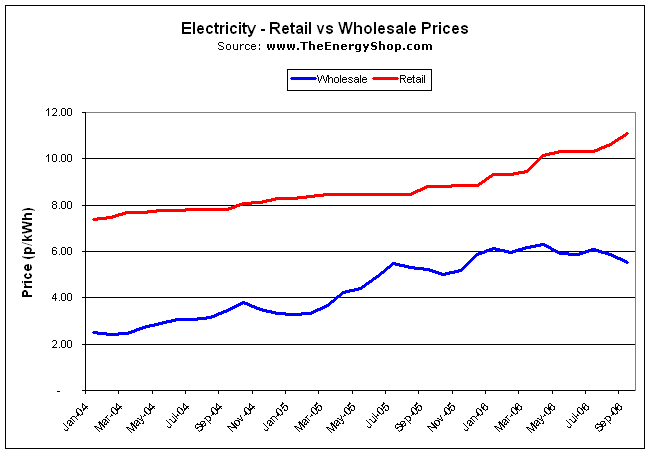Gas and electricity prices have peaked. That was the cheering prediction this month from Joe Malinowski, an energy analyst who runs TheEnergyShop.com, a company that makes its living out of getting us to change our energy supplier. Since January 2004 the average domestic energy bill has risen by £407 a year and now stands at £990. Between us we are paying £8 billion a year more for gas and electricity than we were then. The energy suppliers say that these rises merely reflect rising wholesale prices. But Joe Malinowski’s research shows that they have now passed on the entire rise in wholesale prices – and he believes they will soon have to reflect the fact that wholesale prices for one year ahead have been falling since June. He told me
"Pressure is now on the downside. Wholesale prices have fallen again just this week. Provided wholesale prices stay at current levels. The next move in prices should be down."
Five major suppliers have put their prices up since the wholesale price started falling. It is now about 20% below its peak. To some extent that is understandable. Energy suppliers buy electricity and gas in advance – they have already paid for the fuel we will burn this winter. That is why Joe’s figures are the ‘year ahead’ price. The graph shows the change for gas. The red line is what we pay; the blue what they companies pay for the gas they sell us. The gap between the two covers costs and profits.

But suppliers have been warned that if they do not pass on price cuts – as they did price rises – the energy regulator Ofgem might step in. Its chief executive Alistair Thompson said "should Ofgem feel that the companies are keeping jam on their fingers we will instigate a thorough review. We have very hard Competition Act powers. If they’re found guilty, we can penalise them 10% of their global revenues." Ouch.
Electricity shows a rather different picture. As with gas, recent wholesale price falls have been accompanied by retail price rises. But there is a considerable gap between the two – enough to pay for distribution costs and make a decent profit.

Joe Malinowski – who makes his money from the commission earned when people use his website to change supplier – says the savings from switching are bigger than ever. "Competition has widened the gap between the dearest and the cheapest. The average consumer who has not switched can save somewhere in the region of £230 to £240 a year by moving from their current suppliers for gas and electricity to the cheapest deal." The savings are less certain for those who have already changed supplier. But there are still savings to be made. "Going for direct debit and changing online will get you the best tariffs. If a company needs to acquire customers it can make suicidal deals. Some will knock 25% off their standard electricity tariff to get customers."
Looking at the graphs you can see why.
www.TheEnergyShop.com
www.energywatch.org.uk
www.ofgem.gov.uk
A way to a will
Every two years we are given the chance to make a will and know that the fee
we pay will go straight to charity. It’s called Will Aid and it runs right
through November. Most adults do not have a will. If you die without one then
your property is divided up according to complex legal rules and may not go to
those you want. Even a spouse may not inherit it all. The position is far worse
for people who live together without being married – their partner would
normally get nothing. Scots law is different – and can be fairer – but even
there you cannot be sure that those you love will inherit your property unless
you make a will.
There are 1600 solicitors participating in Will Aid. They will make no charge for a basic will, but Will Aid suggests a donation of £75 for a single will or £110 for a couple who want a pair of wills. A complex will may incur a charge but that will be explained before you commit yourself. If you are a taxpayer you can Gift Aid your donation making it more valuable. Two years ago Will Aid raised £570,000 for the nine participating charities which include Help the Aged, British Red Cross, Save the Children, and Sight Savers International. This year they are hoping for more.
You can find your nearest Will Aid solicitor by calling 0870 0606 239 or on the website www.willaid.org.uk
Red card on overdrafts
Banks have been warned that their overdraft charges may be illegal. The
Office of Fair Trading has said that the charges levied when we go into the red
without permission or exceed our overdraft limit can only be used to recover the
cost to the bank of us taking that unauthorized overdraft. In March the OFT
limited penalty charges imposed by credit card companies to no more than £12 to
reflect the cost of dealing with the breach of the rules. Now it says the same
rules – but not the same amount – apply to penalties for unauthorised overdrafts
as well.
The banks are resisting the move – even though some can charge more than £100 for a day overdrawn. Over the next few months the OFT and the British Bankers’ Association will work together to agree what the actual costs to the bank are when we fall into the red. The OFT may then lay down a guideline as to what the banks can legally charge.
Meanwhile, the consumer organisation Which? says that each year one if four of us slips into the red when a direct debit is more than we expect, a regular payment is less, or we just go on holiday and don’t keep a careful watch on things. It recommends people who are stung with overdraft charges to ask for them to be refunded. If that does not work then write to the bank setting out the charge, claiming it is illegal under the Unfair Terms in Consumer Contracts Regulations 1999, and asking for it to be refunded in full. Those regulations state the contract must not require "any consumer who fails to fulfil his obligation to pay a disproportionately high sum in compensation". So far as Which? knows the banks usually pay up – though it may take some persistence – and you may have to go as far as the small claims court or the Financial Ombudsman Service.
www.oft.gov.uk
www.which.co.uk/bankcharges
www.financial-ombudsman.org.uk
Worcester jug
A couple who bought a small jug on eBay for just over £100 sold it last
month at London auction house Bonhams for £39,000. With premiums and tax the
successful bidder will have to pay nearly £50,000 for a decorated jug which is
less than three inches tall. The ebayers, who want to remain anonymous, thought
the jug might be something special and they emailed a picture of it to Bonhams
where it was recognised as a unique early Worcester cream jug made around 1752.
No other example is known with this moulding and decoration.

Not everyone can hope to have such luck. But Fergus Gambon, senior ceramics valuer at Bonhams says finds are still made "It happens all the time. Some things in every sale are objects that people have brought in which have lain unappreciated. But there is less and less out there undiscovered." He says it is impossible for an amateur to know what is interesting and what is not. But Bonhams do offer a free valuation service at their Bond Street premises during weekday shop hours.
Fergus says ceramics can still be collected for a reasonable amount. Eighteenth century English porcelain can be picked up for £150 or £200. "Another area is early nineteenth century porcelain ‘tea ware’ [parts of tea services]. They are colourful and decorative. But condition is very important. Better to buy one perfect item for £200 than ten damaged pieces at £20 each."